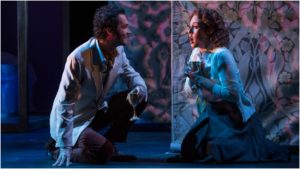
Chicago Opera Theatre 2018 Review: Iolanta
Under Baton of Lidiya Yankovskaya, Tchaikovsky’s Final Opera Is Illuminated
By Marjorie M. RuscheTchaikovsky’s final opera, “Iolanta,” sung in Russian with English supertitles, received a heartfelt and naturalistic production by the Chicago Opera Theater on November 11, 2018, at the Studebaker Theater in the Fine Arts Building, Chicago. With a libretto by the composer’s brother, Modest, “Iolanta” is a 85-minute opera with four scenes presented seamlessly in one act. It explores themes of a young woman’s coming of age, isolation, tragedy, deception, and the healing power of love.
Under the baton of Lidiya Yankovskaya, the new COT’s Music Director (the only woman to hold that position in a Top-50 opera company in the United States), Tchaikovsky’s score became transcendent. With the thorough preparation of the score and empathy with the composer (both having Russian roots and then Western influences), she lovingly guided the singers and orchestra through every ebb and flow of the music, shifting from tenderness to passion, while keeping the pace of the opera moving ahead.
Setting the Mood
Staging (Scottish director Paul Curran) worked with the music to give a realistic, clear, and illuminating presentation of the drama. The Scenic Design (Alan E. Muraoka), Lighting & Production Design (Driscoll Otto), and Costume Design (Jenny Mannis) were imaginative and effective with limited means. The only off-moment in this opera, incongruous with the rest of the production’s aesthetic, was when columns of projected eyes suddenly appear in an Andy Warhol-like pop art fashion, eyes very similar to a certain installation in Millennium Park. This looked suspiciously like a left-over projection from a COT production of Donizetti’s “Il Pigmalione” last Spring.
In Scene one, Iolanta (Katherine Weber, soprano, a princess and daughter of King Rene played by bass Mikhail Svetlov), is serenaded, bestowed with flowers, and cared for by her faithful yet deceptive attendants Brigitta (Katherine Peterson, soprano), Laura (Annie Rosen, mezzo-soprano), and Marta (Emma Ritter, mezzo-soprano). They have been ordered by her father King Rene to shield Iolanta from the facts of her royal birth and her blindness. Iolanta appreciates their company, but in a tense-sounding agitated recitative, has started to sense that something is missing from her life.
The modular blocks of stage set shift and in Scene two Bertrand (David Govertsen, bass-baritone), a guard set outside of Iolanta’s isolated dwelling place, warns Almeric (Aaron Short, tenor), the king’s new messenger, not to reveal the secret of Iolanta’s blindness to her.
King Rene arrives with the physician Ibn-Hakia (Bill McMurray, bass-baritone), who states that Iolanta must become aware of her blindness before she can be healed. Dubious, the king refuses permission for the doctor to treat his daughter, but then sings a heart-wrenching big-tune aria about his love for his child and his willingness to do anything to shield her from suffering. Mikhail Svetlov, a true Russian bass with an exceptionally sonorous voice, evenness of tone throughout his entire range, and soulful emotion, made this one of the musical high points of the evening.
Scene three opens with Iolanta’s betrothed from birth, Robert (Christopher Magiera, baritone), accidentally arriving at Iolanta’s rural hideaway with his friend Count Vaudemont (John Irvin, tenor). Robert wants to call off his marriage to Iolanta since he has fallen in love with another woman (who never appears in the opera). Vaudemont discovers Iolanta’s isolated garden, sees her and falls in love. She awakens, comes to meet her two unknown visitors, and offers them wine. Robert leaves, and in another musical and dramatic high point of the production, Iolanta and Vaudemont gradually fall in love.
A Realistic Portrayal
Weber gives a realistic and convincing portrayal of a blind woman navigating her world through smell, touch, and hearing. Iolanta keeps bringing Vaudemont a white rose (purity) instead of the red rose (passion) he requests. In one of the most poignant moments of the opera, she asks him “What is red?” He realizes she is blind and then describes the world of light and color. The music, with both voices now warmed up and lyrically soaring, grows ever more rapturous as they declare their love for each other.
The lovers are discovered together in Scene four. King Rene – in what drew a few unintentional situational laughs from the audience – asks Vaudemont “Did you tell her anything?” King Rene threatens to execute Vaudemont for trespassing the boundaries of Iolanta’s sanctuary. Yet, the truth ultimately heals. We say that love is blind, but here Iolanta’s newly awakened love for Vaudemont is a catalyst for her recovery from blindness. Ibn-Hakia encourages Iolanta to undergo treatment by him to restore her sight in order to save her new lover. She agrees, and is led off-stage.
Another production high point occurs when Iolanta returns onstage with her new vision. At first, frightened of the flashes of light (effective lighting that reinforces the drama) she appeals to the doctor who helps her through the transition from the unknown (blindness) to known (sight). After Vaudemont assures King Rene that he will love his daughter whether she is sighted or blind, and Robert returns to request release from his previous betrothal to Iolanta, the king agrees to the marriage of Iolanta and Vaudemont.
A joyous ensemble finale ensues with the power of love and light triumphing over suffering. The orchestration of this opera (two flutes, two oboes, English horn, two clarinets, two bassoons, four French horns, two trumpets, three trombones, tuba, harp, timpani, and a small, yet particularly rich-sounding, string section), was stellar and added much to the depth of the dramatic experience.
The chorus sounded terrific. Christopher Magiera, Mikhail Svetlov, and Bill McMurray delivered consistently beautiful singing in lead roles each time they appeared on stage, with ease of vocal production, solid breathe support, and spot-on intonation.
“Iolanta” will be presented on Thursday, November 15th at 7:30 p.m. and Sunday, November 18th at 3:00 p.m. at the Studebaker Theater.


